Related Topics
Downtown
A discussion about downtown area in Philadelphia and connections from today with its historical past.
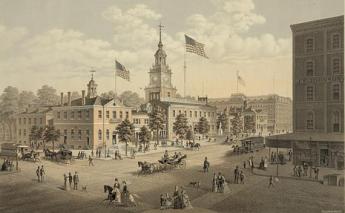
Tourist Walk in Olde Philadelphia
Colonial Philadelphia can be seen in a hard day's walk, if you stick to the center of town.
Up Market Street to Sixth and Walnut
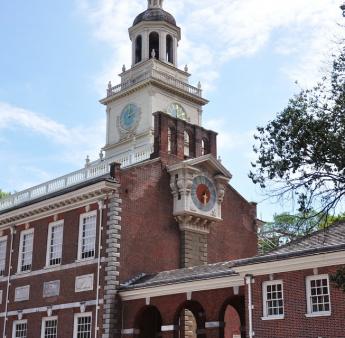 Millions of eye patients have been asked to read the passage from Franklin's autobiography, "I walked up Market Street, etc." which is commonly printed on eye-test cards. Here's your chance to do it.
Millions of eye patients have been asked to read the passage from Franklin's autobiography, "I walked up Market Street, etc." which is commonly printed on eye-test cards. Here's your chance to do it.
Andrew Hamilton (1676-1741)
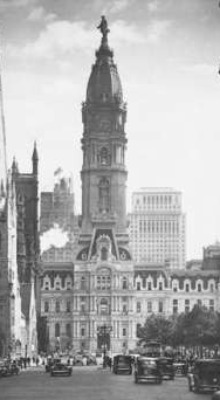
|
| Philadelphia City Hall |
An admirer of Philadelphia Reflections recently asked who is the most under-appreciated Philadelphian, and the quick answer would be William Penn. He's inadequately praised right at the present time, perhaps, but after all the whole State of Pennsylvania is named after him, along with countless universities and institutions, and his thirty-seven foot statue is on top of City Hall. The Pennsylvanian who seems most under-appreciated on a more or less permanent basis is Andrew Hamilton.
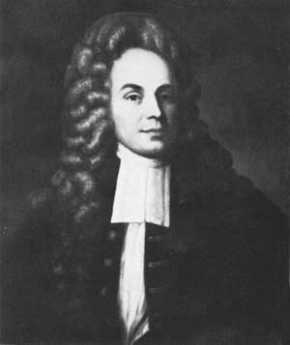
|
| Andrew Hamilton |
That is definitely not Alexander Hamilton, nearly a century younger and no relation. Andrew was born in Virginia but moved to Philadelphia in 1716, aged 30. He is frequently referred to as the finest lawyer of his era in America, holding numerous public offices. He was Speaker of the Pennsylvania House of Representatives in 1735, and 59 years old, when he took on the task of defending John Peter Zenger the New York publisher. For this successful case, he is mainly known today, but it is not true at all that he was then a young unknown lawyer trying to establish a reputation as, the lawyers say, a rainmaker. Rather, he took up the task of defending Zenger in another colony, without fee, because he felt there existed a threat to the entire judicial system and someone had to assert leadership about it. Zenger was in conflict with the Governor of New York, evidently a ruthless sort of person, and the Governor had disbarred Zenger's two defense lawyers for opposing him. Hamilton felt it was the duty of an eminent lawyer from another colony to come forward and see that justice was defended. It was surely not immodest of him to feel that even a wild and wooly governor would not dare disbar the famous chief legislative officer of Pennsylvania. There was probably still some personal risk, and even some risk to professional reputation, because Zenger seemed clearly guilty of breaking the libel laws as they were then understood.
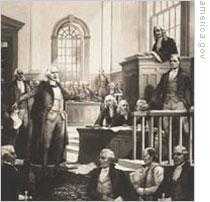 t6
t6
|
| Trial |
Zenger had published articles describing the outrageous conduct of the Governor, and could not deny he had published them. In the common view, he had labeled the Governor. The judge refused to hear evidence that the published stories were true because the law stated that truth was not a defense. The only defense seemingly possible was that the stories somehow did not meet the definition of libel, and the judge suggested to Hamilton that he get on with arguing that particular escape-hatch. Hamilton, however, would have none of it.
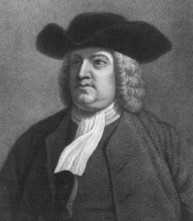
|
| William Penn |
His first statement in defense was that he and his client readily admitted the published articles met the definition of libel, so he would save the prosecutor's time presenting witnesses on the point. He turned to the jury and urged them to nullify any law which prevented injured people from making a truthful complaint, as William Penn had established they had a right to do, nearly a century earlier. In a sense, both Penn and Hamilton were going back to the Magna Charta, where a jury was seen able to set a limit on what any king could do to an Englishman. The judge intervened that a jury may do what they were instructed to do. Yes, said Hamilton, and they may do otherwise. Although the jury had surely never heard of such legal fine points, they didn't like the idea of punishing a man for telling the truth, and firmly declared that Peter Zenger was therefore not guilty of anything, including libel, for doing so.
These principles were destined to become embedded in the United States Constitution fifty years later and were greeted with great praise and published applause by Benjamin Franklin, then the young publisher of the largest newspaper in Pennsylvania. Evidently, Franklin and Hamilton sought each other out, and in time Franklin became the protege and main political associate of Hamilton in the Pennsylvania Legislature.
The Zenger case established the fame of Philadelphia lawyers for all time, and Hamilton is honored by the Philadelphia bar association as their patron saint. No doubt he welcomed the praise of his colleagues, but he certainly did not need it. He had already risen to the top before this case, and it was for that reason he took it on, not as a duty to Zenger, but as a duty to the Law. Like so many people who achieve a little eminence, he had everything to lose and nothing to gain by taking risks. But unlike a common lot of prominent people, he felt a duty to do what he had to do.
Details of the rest of Andrew Hamilton's life are surprisingly sketchy, but property records establish that he was remarkable in a lot of other ways, too. He purchased the land on which Independence Hall is situated, and gave it to the public. He purchased five hundred acres in the wilderness and founded the City of Lancaster on it. And he purchased two hundred fifty acres, later expanded to six hundred, on the high bank of the Schuylkill where European settlement had been first begun by the Dutch, at Gray's Ferry. His son built Woodlands as a country estate, established Woodland Cemetery along Woodland Avenue, and built Hamilton Village as the place in West Philadelphia where the Drexels, Weightmans, Pauls and other wealthy families put their mansions. If you like, you can stroll down the center of the University of Pennsylvania campus, on Hamilton Walk.
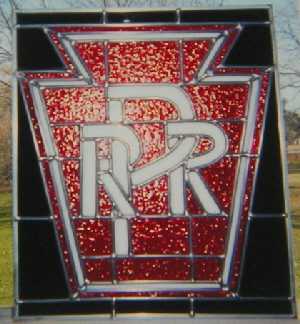
|
| Penn Railroad |
Someday, the glory of all this will surely return. Meanwhile, the Pennsylvania Railroad and successors have made the Gray's Ferry area nearly uninhabitable. Woodland sits behind a thicket of untended bramble, hidden from the trains except for the briefest glimpse if you know to look. The Veteran's Administration Hospital sits on the edge of Woodland, blocking the view unless you know to use Google Earth to see it sitting there begging to be visited. The University has turned its back on Woodland, using it mostly as a backdoor driveway toward its numerous parking garages, fearful the world might notice how close it is to deplorable slums.
ut some day, we can confidently expect that vision will re-emerge, the Schuylkill waterfront should resemble the Seine through Paris, linking Woodland to Bartram's Gardens, and perhaps on to Fort Mifflin. When that day dawns, maybe more people will also remember who Andrew Hamilton was.
Originally published: Friday, March 16, 2007; most-recently modified: Monday, August 26, 2019
| Posted by: Elizabeth | Sep 6, 2018 1:08 PM |
| Posted by: cheapostay discount | Feb 13, 2012 9:43 AM |
| Posted by: esalerugs | Feb 13, 2012 9:21 AM |
| Posted by: Tinajah Jones | Sep 27, 2011 12:37 PM |
in the churchyard of christ church
church
| Posted by: roger arden | Dec 12, 2010 4:31 PM |